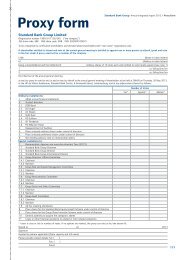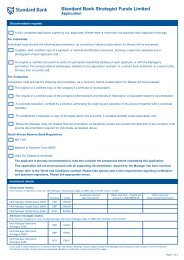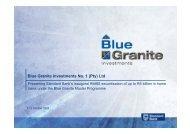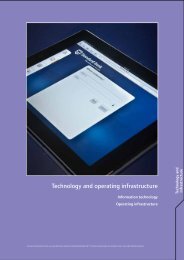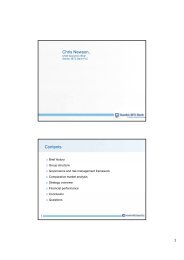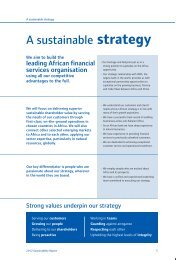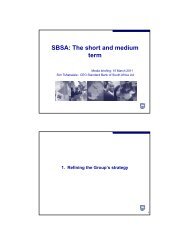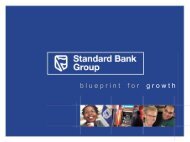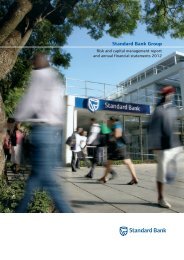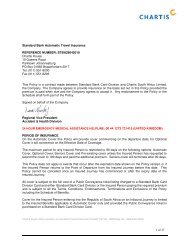Standard Bank Africa Commodity Index ETN brochure
Standard Bank Africa Commodity Index ETN brochure
Standard Bank Africa Commodity Index ETN brochure
Create successful ePaper yourself
Turn your PDF publications into a flip-book with our unique Google optimized e-Paper software.
4<br />
The <strong>Standard</strong> <strong>Bank</strong> <strong>Africa</strong><br />
<strong>Commodity</strong> <strong>Index</strong> (SBAFCI)<br />
The SBAFCI is passive ZAR based index, and aims to reflect a<br />
diversified basket of commodities calculated on the basis of their<br />
average <strong>Africa</strong>n production value of the most recent five year<br />
period. To achieve more stable returns, commodity weights in<br />
the index are adjusted based on an aggregated risk measure of<br />
the commodity returns as outlined in the <strong>Index</strong> Rules Document.<br />
The weightings in the underlying commodities for the <strong>Index</strong><br />
are determined through the application of maximum and<br />
minimum weight thresholds to redistribute commodity weights;<br />
this ensures that no single commodity or commodity sector<br />
dominates the SBAFCI. The index thus invests in four recognised<br />
commodity sub-sectors which include Base Metals, Precious<br />
Metals, Energy and Agricultural. The respective underlying<br />
commodities at the time of issue are Aluminium and Copper,<br />
Gold and Platinum, Crude Oil, Corn and Wheat.<br />
The commodity weightings are revised annually as outlined<br />
in the <strong>Index</strong> Rules Document. The index constituents are<br />
rolled every two months into a more distant liquid contract as<br />
the near-dated future moves closer to expiry in terms of the<br />
agreed weighting across the set of future contracts that is set in<br />
accordance with the <strong>Index</strong> Rules Document.<br />
The SBAFCI is a total return index, created from the near-dated<br />
USD commodity future, USD interest rates and the USD/ZAR<br />
exchange rate. The near-dated future is used as it is typically the<br />
most cost effective way of gaining exposure to commodities; this<br />
is then rolled every two months into the next liquid contract as<br />
the near-dated futures move closer to expiry.<br />
As a total return index, the return is derived from the following<br />
four sources:<br />
1) Performance of the commodity future contracts: change in<br />
the near-dated future’s USD contract prices<br />
2) USD deposit rate that accrues daily on the full value of the<br />
investment: overnight USD Libor less 0.125%<br />
3) Change in USD/ZAR exchange rate<br />
4) Roll and rebalancing yield: a result from rolling the current<br />
future into a distant future due to an approaching expiry.<br />
The future positions will need to be rolled over into more distant<br />
contracts as the near dated contracts approach maturity. The<br />
rolling mechanism will begin 40 days prior to the expiry of any<br />
futures contract, with the position being rolled over a five-day<br />
period to reflect an average roll return. All futures contracts are<br />
pre-determined to ensure that only sufficiently liquid futures<br />
contracts are used.<br />
When rolling from one future to another the full rand value is<br />
rolled into the next future, therefore if the next future’s price<br />
is higher/lower than the near dated one, your exposure will<br />
decrease/increase such that a 1% change in the futures price<br />
still relates to a 1% change in the <strong>ETN</strong> price.<br />
The <strong>Index</strong> was created by The <strong>Standard</strong> <strong>Bank</strong> of South <strong>Africa</strong><br />
Limited (“<strong>Standard</strong> <strong>Bank</strong>”) and launched on 18 August 2011<br />
(the “<strong>Index</strong> Live Date”) and is published live on Bloomberg,<br />
<strong>Index</strong> code: SBAFCI.<br />
The <strong>Index</strong> Rules Document can be viewed on<br />
www.standardbank.co.za/etns



